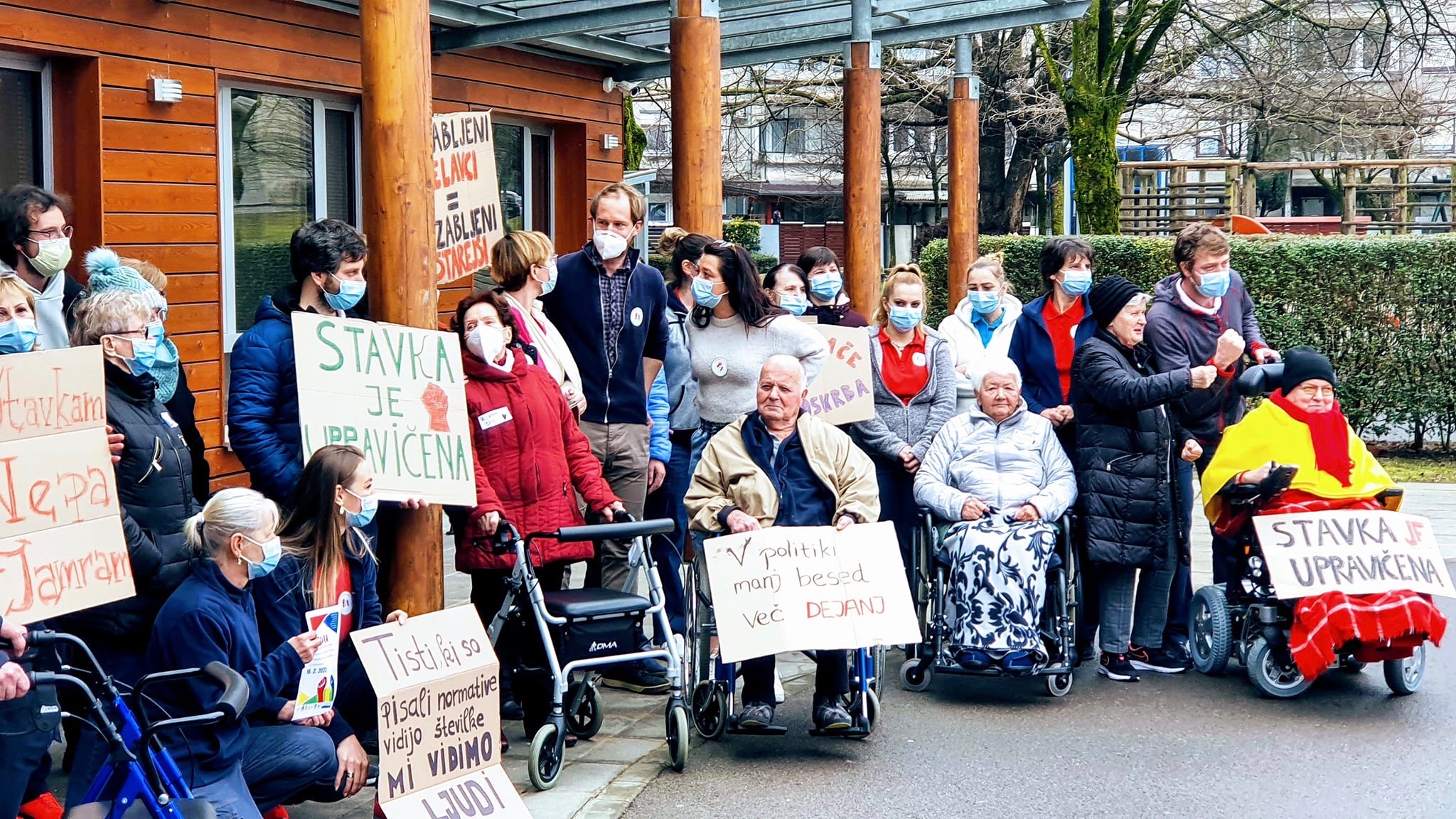On February 16, around 50,000 workers in the Slovenian care and health sectors went on strike protesting poor working conditions, low salaries, outdated norms and regulations, and violations of the agreements signed by their unions and the Slovenian government, which the government continues to ignore. Workers who went on strike included nurses, nursing assistants, care workers, midwives, physiotherapists, laboratory technicians, cleaners, cooks, and many others. In the current situation, many workers in the sector only get the minimum wage, which is a serious issue especially in the context of inflation and rise of prices.
Privatization through concessions
The strike is a result of the long-lasting erosion of rights in the health and care sectors. The workers who perform the most strenuous work have very low salaries, with newly employed workers not even receiving the minimum wage.
Most of these workers are women, which reflects the problematic situation of women in Slovenia. Due to low salaries and stressful work conditions, many hospitals, clinics, retirement homes and other healthcare institutions are faced with chronic staff shortages, which means that workers cannot provide appropriate care to the patients. That is why there is an urgent need to fight for better and higher staffing norms.
Nonetheless, Slovenian politicians don’t find it urgent to immediately solve these problems as they prefer to slowly push the sectors into the private sphere – in the form of concessions. The reason for this lies in the allegedly (too) high public costs of maintaining a public health and care network, and they see private concessionaires as a welcome alternative.
The situation can be most clearly seen in long term care and in retirement homes, where private firms, which get awarded public concessions, are slowly taking over the whole sector. This trend has been growing stronger in recent years, when the multinational Senecura/Orpea started operating in the country.
With the outbreak of the COVID-19 pandemic, the situation became much worse, the workloads became even greater and the pressure on healthcare workers became enormous. The unions and the government managed to come to an agreement and avoid a strike in 2020, but the agreement was not fully respected by the government. Another issue was that through the agreement, some jobs were raised by five, some by three, some by one pay grade, and many by zero – thus not all workers and professions were treated equally. The unions demanded to continue negotiations to solve these discrepancies, but the government refused to cooperate. The unions, left with no other options, decided to go on strike.
Seeking improvements for everyone
The strike, however, did not include doctors as their separate union managed to reach a quick agreement with the government to raise salaries for six pay grades or around 25%.
The Constitutional Court of the Republic of Slovenia has since then made a ruling that the pay-rise given to doctors in the public sectors is unconstitutional, but the effects of the agreement specific for doctors rippled through the rest of the system. In fact, this move, which threatens to collapse the existing public health and care systems, was an additional reason for all the other workers in the sector to go on strike.
All of the sectoral unions – SZSSS, ZSVS, SDZNS, the University Medical Center Union, SPUKC Healthcare Union, Since07 – joined the strike over three main demands. The first demand was an increase of remuneration for all workers in health and social care comparable to doctors and dentists. This would eliminate discrepancies between different jobs and occupational groups in accordance with the agreement on urgent measures in the field of salaries for health and social care activities. It would also guarantee the continuation of negotiations on a new collective agreement.
The trade unions also requested the adoption of standards and norms in health and social care in accordance with previous strike agreements between the government and the unions, as well as a guarantee of striking workers being paid the same amount as if they were working.
The unions stated that strike actions will continue if the government continues to ignore the workers’ demands. Since there is one month left until the parliamentary elections in Slovenia, it is not likely that the current government will be willing to respond to the workers’ demands. Still, the trade unions hope that putting pressure through industrial actions will prove to be an efficient way of making the political elites address the workers’ grievances.
So far, the strike activities have not yielded the desired results, but they have led to union membership increases and strengthening of the cohesion of existing union membership, thus strengthening organizational power for future actions. The strike committees are also planning to sharpen their activities after the upcoming election.
Read more articles from the latest edition of the People’s Health Dispatch and subscribe to the newsletter here.
The Centre for Social Research (CEDRA) is an independent research collective working for research, education and active participation in the development and advancement of the trade union and labour movement in Slovenia.





